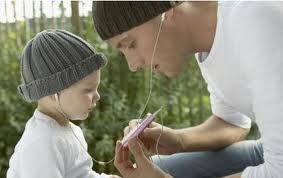 Too often, teen pregnancy is thought of as an adolescent female's problem, but as they say, it takes two to tango. Of the approximately 10 million adolescent males aged 12 to 16 in 1996, a national study revealed that almost one in 10 became fathers before their 20th birthday(1). The Office of Adolescent Health (OAH) notes the special challenges that teen fathers and their children face.
Too often, teen pregnancy is thought of as an adolescent female's problem, but as they say, it takes two to tango. Of the approximately 10 million adolescent males aged 12 to 16 in 1996, a national study revealed that almost one in 10 became fathers before their 20th birthday(1). The Office of Adolescent Health (OAH) notes the special challenges that teen fathers and their children face.
Many teen fathers are eager to play an important role in their child's life. However, emotional attachment can be difficult as the majority of teen fathers do not live with their child. Also, adolescent fathers typically have poorer earnings potential than their peers who delay parenthood, in part because of lower educational attainment (although many males were already behind in school before they fathered a child).(2) Research shows that only 50 percent of teen fathers who have children before they are 18 finish high school or get their GED by age 22. Just under half of teenage fathers continue on to father more children by their early- to mid-20's.
Children of adolescent fathers often face challenges as well. Studies have found that children who live apart from their fathers are more likely to be reared in low-income homes and are at an increased risk for poor health.(3,4) Also, recent research shows that sons of adolescent fathers are nearly twice as likely to repeat the cycle of young parenthood and become teenage dads themselves.(5)
June is Men's Health Month, a time when adolescent males can recognize the importance of caring for their overall health. Adolescent males tend to be more physically active than females, yet they are also more likely to have behavioral problems, including conduct disorders and ADHD, and to be diagnosed with certain STDs, such as syphilis and HIV. Therefore, screening for these and other conditions is an important step in identifying health issues and getting treatment.
Parents and other caring adults in an adolescent male's life can encourage healthy behaviors and growth by setting good examples and establishing open lines of communication. Resources are available for adolescent males and those that care about them:
HHS' Men's Health Month page has tips on how to connect with your adolescent male on health issues; adolescent males can also learn how to make healthy and responsible choices at the Office on Women's Health's Men's Health Teen page.
Fatherhood.gov, the National Responsible Fatherhood Clearinghouse, has a resource page for teen dads, and expecting teen dads, to help them play an important role in their child's life from the very beginning.
1 Analysis of data from the National Longitudinal Survey of Youth 1997.
2 Ibid.
3 The National Campaign to Prevent Teen and Unplanned Pregnancy. Why it Matters: Teen Pregnancy and Responsible Fatherhood.
4 Nock, S.L., & Einolf, C.J. (2008). The One Hundred Billion Dollar Man: The Annual Public Costs of Father Absence. The National Fatherhood Initiative (www.fatherhood.org).
5 Fletcher, J.M. & Wolfe, B.L. (2011). The Effects of Teenage Fatherhood on Young Adult Outcomes. Economic Inquiry, 49: no. doi: 10.1111/j.1465-7295.2011.00372.x
